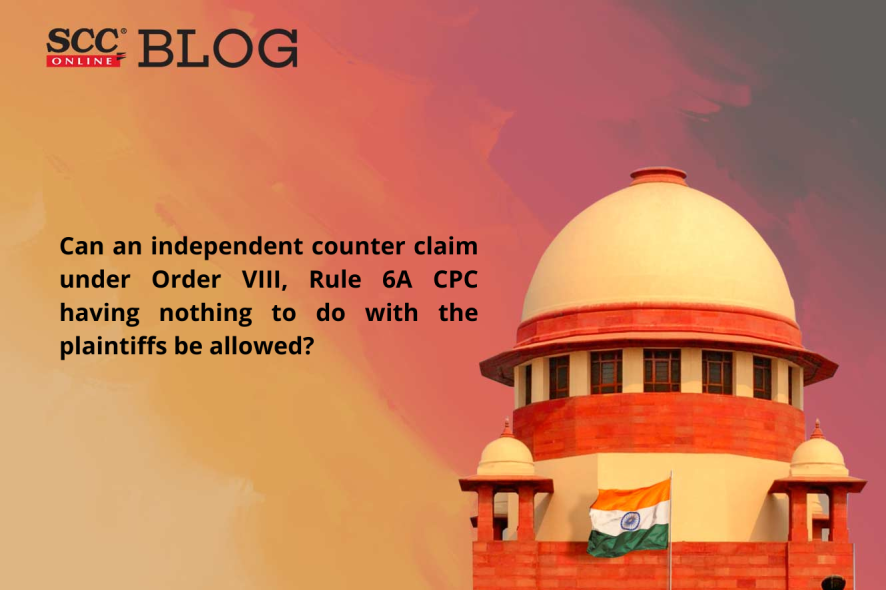Supreme Court: The 3-judge bench of UU Lalit, S. Ravindra Bhat and Sudhanshu Dhulia*, JJ has held that a counter claim under Order VIII, Rule 6A of the Code of Civil Procedure 1908 (CPC) can be set up only “against the claim of the plaintiffs”.
The Court was dealing with the case relating to declaration and possession on an agricultural land. According to the plaintiffs, the defendant No. 2 was their tenant who had sub-let the land to his son (defendant No.1), without the consent of the plaintiffs/landlords and hence, the two defendants were liable to be evicted and the possession of the land was to be handed over to the plaintiffs.
According to defendant No. 2, one Indraj was the original owner of the property, who had given this land in tenancy to his father. Indraj died in the year 1976 and was succeeded by one Ram Kaur. Meanwhile, the defendant no. 2’s father died in the year 1978 and consequently he and his two other brothers had jointly inherited the tenancy. Thereafter, all the three brothers became tenants under Ram Kaur and they continued to be in possession of the suit property. They denied that they were ever tenant of the plaintiffs.
Defendant No.1 argued that he had no concern with the land in question as he was born in the year 1966 and hence, he was only twelve years of age in the year 1978 when the sub-tenancy is alleged to have been created in his favour, as per the revenue records. He never cultivated the land and the cultivation was done by his father and his two uncles, and the entries made in the revenue record showing him to be a tenant or a sub-tenant are wrong and have been made by the plaintiffs, in collusion with the revenue officials.
In addition to these written statements, the defendant no. 2, while denying the rights of the plaintiffs on the land of which particulars had been given by the plaintiffs, inserted the two plots, setting a counter-claim on them.
The Trial Court and the First Appellate Court while dismissing the plaintiffs’ suit had allowed this claim for without assigning any reasons.
While the Punjab and Haryana High Court upheld the findings of the two Courts on the sub-letting and tenancy and upheld the findings of the lower courts in favour of the defendants as there was no subletting of the land, it also held that the counter claims set up by the defendant could not be decreed since the plaintiffs themselves had not set up any claim whatsoever for these two plots and therefore under provisions of Order VIII, Rule 6A CPC, an independent counter claim having nothing to do with the plaintiffs can never be allowed.
The Supreme Court, in appeal, agreed with this reasoning and observed that since there was no claim of the plaintiffs regarding the two plots in question, the defendants were barred to raise any counter claim on these Killa numbers in view of Order VIII, Rule 6A of the CPC as it has nothing to do with the plaintiffs.
It explained,
“It is true that a counter claim can be made by the defendant, even on a separate or independent cause of action. The Legislature permits the institution of a counter claim, in order to avoid multiplicity of litigation. But then it has certain limitations such as that the counter claim cannot exceed the pecuniary limits of the jurisdiction of the court, and that such counter claim must be instituted before the defendant has delivered his defence or before the time limit for delivering his defence has expired. More importantly, such a counter claim must be against the plaintiff!”
In the present case, the counter claim was not against the plaintiffs. Moreover, the plaintiffs had not claimed any right over the property and the two plots are not even a part of the suit property described in the plaint by the plaintiffs.
Hence, as such a counter claim should have been excluded in terms of Order VIII, Rule 6C of the CPC, the counter claim set up by the defendants was held to be rightly rejected by the High Court.
[Satyender v. Saroj, 2022 SCC OnLine SC 1026, decided on 17.08.2022]







